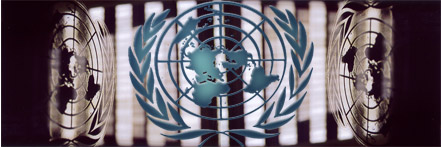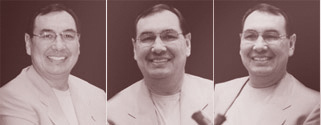|


LIVE COVERAGE
FROM THE UN PERMANENT FORUM ON INDIGENOUS ISSUES

J. Wilton LITTLECHILD,
C.M., Q.C.
Cree
International Organisation of Indigenous Resource
Development
Willy Littlechild
Presentation to the Permanent Forum
PM Session, May 13, 2002
Audio Clip
Interview
J. Wilton Littlechild
Guatemala, 2001
Let me begin by relating an experience in Council with our
Elders with respect specifically to participation.
Participation has been an issue since the beginning for our
dialogue with States on the rights of Indigenous Peoples.
In the early 80's when we began this international
initiative our Elders sat us down and they said, first of
all, we asked them (speaking in Cree), we asked the Elders
"How should we approach these new initiatives that are being
discussed: laws being proposed that will affect Indigenous
Peoples?". And the response that they gave us was: (speaking
in Cree) "It is much better for you to be in the arena
personally, discussing and helping contribute to the
development of laws that will impact you, (speaking in Cree)
it's much easier to criticize from the outside others who
are involved with legislation. So (speaking in Cree) it's
much better for you personally to be there representing
yourself."
So I start with that bit of history because that has been
our approach ever since then…ours and the…(speaking in Cree)…the
Cree Nation of Bear Hills Treaty Six Territory of Alberta.
As we participate in these different international arenas,
we always recall the words of the Elders who advised us to
be in the room representing our interests and representing
ourselves, speaking on our own behalf, that's what we've
tried to do in all of this endeavour.
Now we come across three different forums: of course there
is the International Labour Organization, there's the United
Nations and now the OAS itself, the Organization of American
States, all of which have designed legislation, or
international instruments regarding the rights of Indigenous
Peoples. We have tried to be involved at every stage of
those in the best way that we can from a positive approach
to make sure that we not only protect our rights,
specifically our treaty rights, but also try to maintain
those rights and having done so also try to strengthen or
enhance those rights at each of those arenas. We found that
over the decades because of the evolution of instruments of
time, of course, we've tried to improve on each step of the
way and that's the approach we've used.
A new development, a very recent development at the United
Nations is the UN Permanent Forum for Indigenous Peoples.
That initiative actually took eleven years. It's not an easy
move to convince the United Nations to establish a Permanent
Forum within eleven years, but in retrospect, that was
actually fast. When you look at the pace the United Nations
moves with other instruments, for the Convention on the
Rights of the Child, that took twenty seven years.
For the Declaration on Minorities, that took seven years.
The Convention on the International Criminal Court took
three years. So one needs to question how come after
nineteen years we have not come to an agreement on the
Declaration on the Rights of Indigenous Peoples? And
obviously when you compare with the other instruments,
wherever there is political will they can do things, the UN
can move, the OAS can move.
So it is up to us to try and convince the State members that
what we are trying to do in seeking to protect our rights is
to contribute to either the OAS family or the United Nations
family or the ILO family or any other international entity
that has to deal with our rights as Indigenous Peoples.
The Permanent Forum that has been established at the United
Nations happened fairly fast because, while it is eleven
years, it is fairly fast - because we put a time limit on
the discussions and that's what may have to be considered
for the discussions with the UN Declaration so that we can
come to an early decision on it because after nineteen years
there is a resolution that the General Assembly has passed,
that the Declaration be passed by 2004 which is the end of
the International Decade for Indigenous Peoples. So there is
a time frame that's there, but we need to refocus on that.
So participation is very important for us. We were
instructed by our Elders to be there, so we try and make
every effort to participate. We want to ensure for our
brothers and sisters from other areas, the Indigenous
Peoples from all other areas, whether it's the Americas or
elsewhere, that what we seek in participation, is full,
equal and direct participation. That means we want to be
there speaking for ourselves. If it includes a right to
vote, it's full participation. Then that is what we seek.
The very positive aspect of the UN Permanent Forum, a unique
and very important positive aspect is that we have equal
status at the UN Permanent Forum, equal status meaning there
are going to be sixteen representatives selected from eight
global regions around the world, eight will represent State
members of the UN and eight will represent Indigenous
Peoples from around the world. That equal representation is
very significant, especially for us from Treaty nations who
argue that we signed Treaties on a nation to nation basis
and equal participation to us would mean that nation to
nation Treaty relationship aspect. So for us it was a very
significant advancement when the ECOSOC passed the
resolution to establish the Permanent Forum. So it allows us
to participate more internationally. What we would like to
see, of course, is a similar initiative at the OAS, at the
OAS level, because while it took us some twenty four years
to advance at the UN, it has taken us a similar amount of
time in retrospect at the OAS, because we simply do not have
a level of participation possible at the OAS.
So now we have an entity, a possibility at the OAS that
would be similar to the UN where we could establish a
Permanent Forum. That would be moving actually, the OAS
Forum miles because when we began with the OAS initiative in
1995, the OAS simply does not have a mechanism for anyone to
participate, anyone, meaning civil society to participate,
whether its women or disabled people - there is just no form
for civil society to participate at the levels that we want
to participate at the OAS, so it's a very significant
advancement in how the OAS deals with its business that we
have even been able to participate minimally as we have in
the past with the OAS Declaration. So that's important. It
would be very significant and it would probably move the OAS
much faster than the eleven years it took for the UN to
establish a Permanent Forum.
So what do they do at the Permanent Forum? They discuss
under the current mandate economic, social and cultural
rights, human rights and other rights that can be brought
forward by any particular Indigenous representative that has
concerns or state representatives that has concerns with
Indigenous issues. So I look forward to the work of the
Permanent Forum being very meaningful for us in advancing
our rights.
For example, the UN Declaration could be an initiative that
could be brought to the Permanent Forum now that it is going
to be established, either to complete the work or to improve
on it if improvements are necessary and I am sure there are.
The OAS Declaration could be an instrument that could be
given to the Permanent Forum, while it would remove it from
the OAS, maybe there would be disagreement on that. But I
see potential work immediately for the Permanent Forum, it's
what I mean. So, hopefully we'll get to that stage as well
with the OAS (continues speaking in Cree).
Indigenous Peoples
Permanent Forum on Indigenous Issues
UN Coverage of the UN
Permanent Forum on Indigenous Issues
Media Advisory
Department of Public Information
United Nations Press Release:
PERMANENT FORUM ON INDIGENOUS ISSUES AN IMPORTANT STEP
TOWARDS PARTNERSHIP WITH INDIGENOUS GROUPS, THIRD COMMITTEE
TOLD
Fifty-sixth General Assembly
Third Committee
29 October 2001
24th Meeting (PM)
Live Coverage of PF
|


